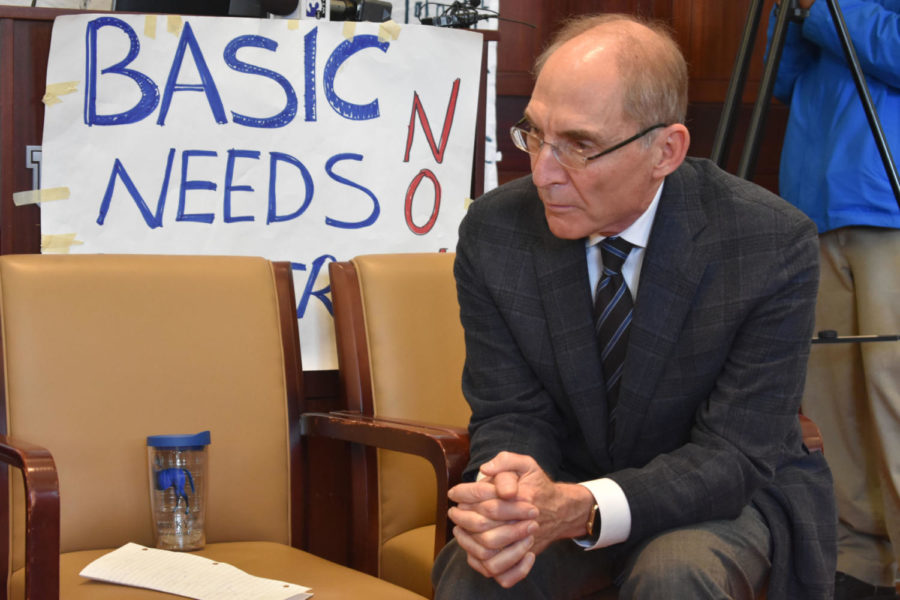UK building occupation continues after intense meeting with Capilouto
President Capilouto listens to student concerns during the meeting between him and the Black Student Advisoy Council and the Basic Needs Campaign on Tuesday, April 2, 2019 in Lexington, Kentucky. Photo by Natalie Parks | Staff
April 2, 2019
The demands by the Black Student Advisory Council and the Basic Needs Campaign were not met during Tuesday’s meeting with President Capilouto. The hunger strike and occupation of the Main Building will continue.
The Black Student Advisory Council came into the meeting with five demands. Of those, only the first—to include the Council on all search committees for upper level administrators—was met in full. Their requests to revise the William C Parker scholarship and standardize the roles of diversity inclusion officers were countered by a proposal of task forces with deadlines of May 1 and June 1, respectively.
The fourth demand, for the full Cook Ross survey from 2016 to be released, was conditionally agreed upon. The administration will arrange briefings of that survey and other work-life surveys in as timely a manner as possible.
The fifth and final demand, for the mural in Memorial Hall to be removed, was a hot button issue for many in the crowd. The mural, which depicts slavery in Kentucky, has been the focus of controversy in the past. A 2016 task force was formed in response to student protest and a second art piece was added to provide additional historical perspective. The demand to remove the mural was added back to the Council’s list of demands at their town hall meeting on Monday evening.
“I have to confess it is difficult for me to consider removing that piece of art,” said Capilouto during the meeting.
Council members repeatedly emphasized that the mural is a cornerstone issue for them.
“It’s not something that the University of Kentucky’s students are willing to put up with anymore,” said Tsage Douglas, chair of the Council. “We’re not willing to be bought and sold.”
Chandler Frierson, a founding member of the Council, compared the mural to UK’s treatment of black students in general. He called for structural change instead of the surface fixes.
“I deserve a college experience,” he said to snaps from the crowd.
The mural discussion prompted emotional testimonials from many others in the crowd.
“Do you not see us?” said J.D. Brown-Lewis during an impassioned speech. He went on to say that “this is less about our demands, and more about compassion.”
“I’m watching my brothers and sister sit up here and cry, defenseless,” said Mia Thompson of the emotional speeches from crowd members.
After the mural discussion ended with no resolution, the Council turned the meeting over to the Basic Needs Campaign. They have three demands related to food and housing insecurity among UK students.
Capilouto shared many of the sentiments that the Basic Needs Campaigners did, saying that he did not disagree that food and housing insecurity are an issue.
“We have got to do more to be responsive and I want to do more and we will do more,” Capilouto told the crowd.
Beau Revlett, a member of the Basic Needs Campaign, then expressed frustration with the president’s reluctance to take the final step towards creating a Basic Needs Center, which Revlett said combines the wants of the Campaign and the administration. At present, the administration has shifted the responsibilities of six staff to focus on food and housing insecurity.
Capilouto committed to adequate staffing, but stopped short of promising a new staff member solely dedicated to basic needs coverage. He did say it was on the table after the university evaluates their current efforts. The Basic Needs Campaign and Capilouto concluded by scheduling a meeting for tomorrow to further discuss these efforts.
The hunger strike, now in its sixth day, will continue. About 350 students have agreed to fast in solidarity, though to varying degrees.
Students in the crowd spoke passionately about their frustration with the administration’s, and the president’s, level of cooperation and reluctance to truly listen to black students.
“You’re supposed to be our voice,” said Aliyah Austin, a sophomore, to the president. “We come to you.”
“If you’re not seeing that what you’re doing is not enough, that’s part of the problem,” said Thompson, who spoke several times and livestreamed periodically throughout the event.
Several students complained about how the university’s approach to solutions end up putting more work back on students. Others spoke about their readiness to transfer schools, saying they don’t receive enough support from the university to continue.
The greatest frustration came from student organizers, who say the time for discussion and meetings is over.
Both the Council and the Basic Needs Campaign have met with Capilouto and other administrators previously. A lack of progress has left both groups frustrated, citing endless discussions about problems and not enough conversation on solutions.
“The time for task force has ended. The time for committee has ended. It’s time for action and commitments,” Douglas said. “Prolonging the issue is not something black students are interested in.”
“I walk out of here knowing I got to do a better job,” said Capilouto as the meeting began to end.
The Black Student Advisory Council and the Basic Needs Campaign were left unsatisfied with the results of the meeting. They will continue their occupation.
“I’m feeling energized,” said Douglas. “The more resistance there is, the more that fuels my fire. I’m ready to fight back.”
































































































































































